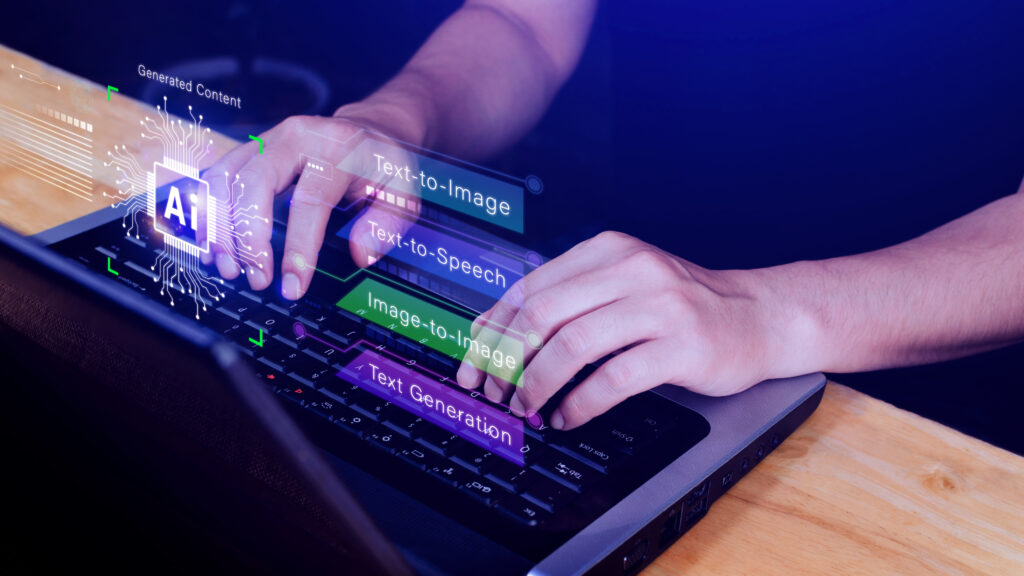As a content creator or brand marketer, you will have firsthand experience of the challenges involved in consistently producing high volumes of creative, engaging content. But what if AI could help? In this article, we explore the transformative impact of creative algorithms on content generation. From identifying trending topics to generating completely original text and images, AI is revolutionizing content creation across social media. We consider key innovations in AI content tools, how they enable personalized, scalable content production, and their implications for brands and creators aiming to have better audience engagements. The rise of creative algorithms marks a new frontier in AI-driven content marketing. Read on to discover how you could harness these groundbreaking technologies to enhance your content strategy.
AI Is Revolutionising Content Creation on Social Media
Personalized and Engaging Content
AI enables the creation of highly personalised and engaging content at scale for social media. Algorithms can analyse a user’s interests, behaviours and interactions to generate content tailored to their preferences. This results in a more engaging experience and stronger connections between brands, creators and audiences.
Automated Content Creation
AI also allows for the automation of content creation. Algorithms can generate social media posts, blog articles, product descriptions, email newsletters, and more. Systems can tap into a knowledge base to assemble coherent and compelling content pieces with little human input. It significantly amplifies the volume and velocity of content that can be produced.
Micro-Targeting of Audiences
Content can be tailored to micro-target specific audience segments with the help of AI. Algorithms analyze user data to identify key groups based on attributes like demographics, locations, interests, and behaviors. For each segment to achieve the best engagement and conversions, content is optimized. This precision targeting allows for a much more personalized experience at scale.
Continuous Optimization
AI enables real-time optimization of content. Algorithms can test different variations of posts or other content to determine which options achieve the best performance. They then automatically update the content to the optimal versions. This continuous optimization helps to maximize key metrics like clicks, shares, time on page, and conversions.
Safe to say, AI is revolutionizing how content is created and distributed on social media. Algorithms enable personalized, engaging content at scale, the automation of content generation, micro-targeting of audiences, and real-time optimization. This significantly impacts how brands, creators, and audiences interact and connect on social platforms.
The AI Advantage in Creating Personalised, Engaging Content

AI systems can generate content at scale based on people’s interests and behaviors.
AI tracks users’ interactions to understand their interests and tailor content to their needs. It can suggest content or products people might enjoy based on their profiles and behaviors. This personalization helps to keep audiences engaged.
Optimization
AI systems optimize content for maximum impact by A/B testing elements like headlines, images, and wording. They determine the content variations that generate the most clicks, shares, and time on the page. Creators can then produce more of the content that resonates most.
Continuous experimentation
AI never stops learning and improving. It constantly experiments with new content elements and optimizes based on user feedback. This ongoing experimentation and adaptation allow AI systems to stay up-to-date with audiences’ changing interests.
Scalability
AI can generate huge volumes of content at a scale that would be impossible for humans alone. In seconds, it can produce multiple headline options, image selections, and full articles or social media posts. This scalability gives brands and creators a major advantage, allowing them to engage audiences on a much larger scale.
While AI will not replace human creators, it enhances and amplifies human creativity. When creators and AI work together, they can achieve a new level of personalization, optimization, experimentation, and scalability that transforms how content engages and impacts audiences. AI is the perfect creative partner for the digital age.
How Brands Are Using AI to Connect With Audiences
Personalized Content at Scale
- Brands are leveraging AI to generate personalized content and tailored experiences for each customer. By analyzing individual customer data and preferences, AI can produce customized content, product recommendations, and marketing campaigns for specific audiences. This personalized interaction helps foster stronger customer relationships and loyalty.
Automated Content Creation
- Nowadays, AI is being used to automatically generate written content, such as blog posts, social media posts, and product descriptions. AI can analyze a brand’s content and style guidelines to produce new content in a consistent voice and tone. The content can then be reviewed and optimized by human editors. Automated content creation significantly increases content volume and reduces the time and cost associated with human-only content generation.
Optimised for Engagement
- AI tracks how audiences interact with and respond to content. It then uses this data to optimize future content for maximum engagement and impact. Factors like time spent on a page, social shares, comments, and click-through rate are analyzed to determine what content and messaging resonates most with target audiences. Brands can then produce more of the content that is proven to stimulate interest and drive desired actions.
Personalized Experiences
- AI powers personalized experiences across digital channels. For example, dynamic product recommendations on ecommerce sites and personalised social media ads tailored for specific audiences. By understanding individual interests and behaviors, AI can provide customized suggestions, content, and offers designed to capture attention and motivate action. Personalized experiences like these lead to higher engagement, conversion, and loyalty.
- In summary, AI is enabling brands to connect with audiences in new ways through personalized and engaging content experiences at scale. When combined with human judgment, AI becomes a powerful tool for building brand loyalty and driving business growth. The future of content creation and marketing will be shaped by intelligent algorithms working together with creative human minds.
The Future of AI-Driven Content Creation
AI has significantly transformed how brands generate and distribute content to engage their audiences better. As AI continues to evolve, its impact on content creation will intensify.
AI enables hyper-personalized content tailored to individual users based on their inferred interests and preferences. By analyzing users’ online behavior and interactions, AI can determine the topics, styles, and formats of content that specific users will find most engaging. This allows brands to provide each user with customized content designed for their interests.
Automated and Optimised Content
Artificial Intelligence will continue to enhance content automation by generating draft content, optimizing and repurposing existing content, and suggesting content ideas. These AI writing assistants produce draft blog posts, social media updates, and other short-form content by analyzing a brand’s existing content and style. They can also optimize content by restructuring and rewording posts to improve readability, flow, and search engine optimization. AI may recommend trending topics and content formats to help brands stay on the cutting edge.
Interactive and Conversational Content
AI will enable more natural and engaging interactions through conversational content. Chatbots and voice assistants can hold basic conversations with audiences, answer questions, and provide helpful information in an interactive way. These AI systems are becoming increasingly sophisticated and linguistically capable. Conversational content may transform how brands connect with and serve their customers.
The future of AI-driven content creation is both promising and uncertain. While AI will enhance content personalization, automation, and interactivity, it also introduces risks around bias, privacy, and job disruption that brands must consider seriously. With prudent management and oversight, AI can help brands achieve new heights of audience understanding and engagement through innovative, impactful content experiences. Overall, AI will be instrumental in shaping the next generation of content creation.
AI’s Transformative Impact on Content Generation FAQs
How is AI revolutionizing content creation?
- Artificial intelligence has enabled the automation of content creation at an unprecedented scale. AI systems can generate personalized and engaging content for social media platforms based on user data and interests. This allows brands and content creators to interact with their audiences in a highly customized fashion.
How does AI create content?
- AI leverages machine learning algorithms trained on massive datasets to understand language and generate new content. The algorithms detect patterns in the data to build a complex model of language. It is further used to produce new pieces of content, like social media posts, product descriptions, blog posts, and more. Thus, the content is tailored to match the interests and preferences of the target audience.
What are the benefits of AI-generated content?
- AI enables the fast, scalable production of content that resonates with audiences. This allows brands and creators to keep up with the rapid pace of social platforms and consistently engage their followers. Personalized content also helps to build brand loyalty and increase conversion rates. Furthermore, AI can take over repetitive and mundane content creation tasks, freeing up human creators to focus on more strategic work.
What are the limitations and risks?
- While AI shows promise for content generation, human judgment and oversight are still required. AI systems can reflect and even amplify the biases in their training data. They may also generate inappropriate or nonsensical content if not properly monitored. In addition, AI cannot replicate human creativity, empathy, and emotional intelligence, which are required for impactful storytelling. Human content creators will still play a key role in crafting compelling content and experiences. With proper governance and hybrid human-AI collaboration, the risks can be mitigated while realizing the benefits of AI for content creation.
In summary, artificial intelligence is enabling a new era of personalized, data-driven content creation. When developed and applied responsibly, AI can be a hugely valuable tool for revolutionizing how brands and creators engage with and serve their audiences. The future of content is creative algorithms and human-AI collaboration.
To Sum It Up!
- As we have seen, AI is rapidly transforming content creation across social media and the wider digital landscape. With the ability to generate personalized, engaging content at scale, creative algorithms are empowering both brands and individual creators to connect with their audiences in new ways. Though concerns around authenticity persist, the transformative impact of these technologies is undeniable. Harnessed thoughtfully, AI promises to augment – not replace – human creativity, opening new frontiers for self-expression and human connection through technology. The future remains uncertain, but it is clear algorithms will play an increasingly central role in how we produce and consume creative content online. Our task is to guide these emerging technologies towards their highest purpose – enabling more voices to be heard and bringing people together through the power of shared stories.
More Stories
KT Cloud Accelerates Digital Growth with New High-Tech Data Center in Yecheon-Gun
KT Cloud new data center in Yecheon-gun marks a key public-private effort with Gyeongsangbuk-do and Yecheon County.
Microsoft Cloud Momentum Fuels AI Growth Across Indonesia and Malaysia
Microsoft Cloud services expands strategically into Indonesia and Malaysia to reshape Southeast Asia’s technological landscape.
Roblox Farming Craze Fuels Surging App Store Economy
As you dive into the dynamic world of digital economies, one phenomenon stands out: the Roblox farming craze. This surge,...
NVIDIA Powers Up: Revolutionizing AI Data Centers with 800V HVDC Systems
NVIDIA emerges as a pioneer, revolutionizing the backbone of AI data centers through its cutting-edge 800V high-voltage direct current (HVDC) systems.
Bluesky Reinvents the Blue Check: A Decentralized Take on Digital Trust
In an era where digital trust is critical yet fragile, Bluesky offers a bold new approach to online verification. Bluesky...
Confluent Unifies Real-Time and Historical Data to Power Next-Gen AI and Analytics
Confluent has made major progress by upgrading its Confluent Cloud platform. These enhancements aim to unify data streams for advanced AI applications.


